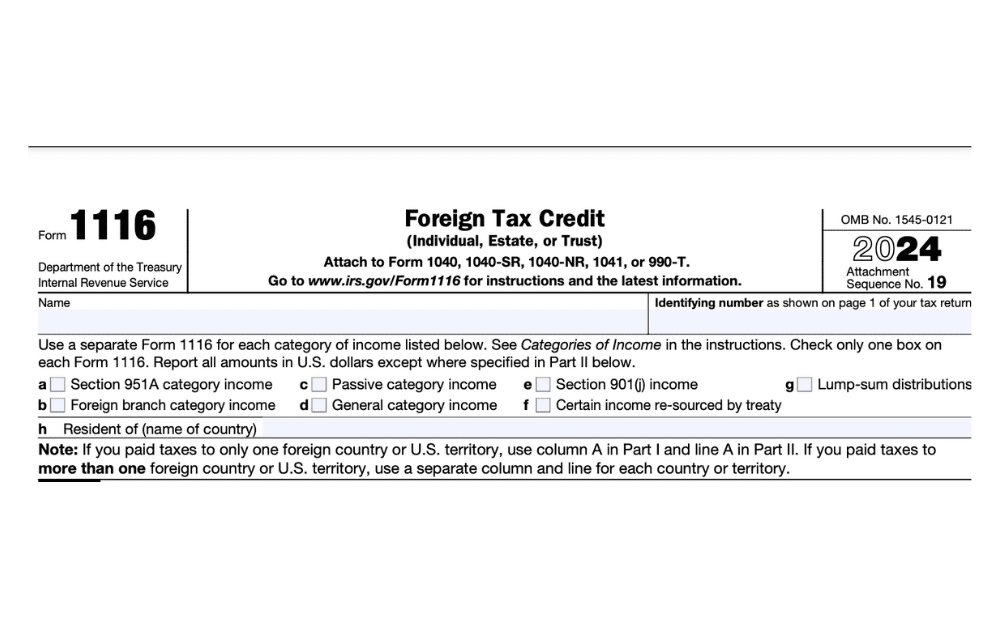Foreign Tax Credit: How Expats Can Reduce US Taxes

- What Is the Foreign Tax Credit?
- Who Qualifies for the Foreign Tax Credit?
- What Foreign Taxes Qualify for the Foreign Tax Credit?
- How to Claim the Foreign Tax Credit
- Foreign Tax Credit vs. Foreign Earned Income Exclusion
- Foreign Tax Credit Carryover Rules
- Common Mistakes Expats Make with the FTC
- FAQs About the Foreign Tax Credit
- Get Expert Help with Your Foreign Tax Credit with Greenback!
One of the biggest tax challenges for US expats is double taxation — having to pay income tax both to the US and to a foreign country. Fortunately, the Foreign Tax Credit helps reduce or even eliminate US tax liability by crediting foreign income taxes paid.
Key Takeaways
- The Foreign Tax Credit allows American expatriates to offset their United States tax liability with foreign income tax obligations.
- Some taxpayers may not be able to use it, such as those who only have income from sources within the United States and those that do not pay any foreign taxes.
- Instead of claiming the foreign tax credit on Form 1116, there is the option to claim a deduction for foreign taxes paid as an itemized deduction on Schedule A of Form 1040.
What Is the Foreign Tax Credit?
The Foreign Tax Credit (FTC) is a US tax benefit that allows expats to reduce their US tax liability dollar-for-dollar based on the income tax paid to a foreign government. For every $1 of foreign income tax paid, you can lower your US taxes by $1. While there’s no fixed dollar limit on the FTC, the amount you can claim each year is limited to the US tax attributable to your foreign income. Any unused FTC can be carried back one year or forward for ten years.
Without the FTC, US expats working abroad could face hefty tax burdens when paying income tax to both countries. With this credit in place, you can shield yourself from double taxation and save big.
The FTC is especially helpful for expats in high-tax countries where your foreign income taxes might exceed your IRS tax bill. In that case, you can use the FTC to erase your US taxes entirely.
Example of How the Foreign Tax Credit Works
Let’s say Mark is a US citizen working in Germany. His only income is from this salary in which he earns $120,000 per year. Germany has a high-income tax rate, and he pays $35,000 in German income tax. His US tax liability before credits is $30,000.
Since Mark has already paid $35,000 in German income tax, he can use the FTC to offset his entire $30,000 US tax bill — meaning he now owes $0 to the IRS. The remaining $5,000 of unused FTC can be carried forward for future use. (More on that below!)
Who Benefits Most from the FTC?
- Expats living in high-tax countries like France, Canada, Germany, and the UK.
- Expats earning wages, self-employment income, or passive income (e.g., rental income, dividends) abroad.
- Expats who cannot use the Foreign Earned Income Exclusion (FEIE) or who want to preserve their ability to contribute to US retirement accounts.
Who Qualifies for the Foreign Tax Credit?
To claim the FTC, you must meet the following criteria:
- Be a US citizen or Green Card holder
- Have foreign-earned income subject to foreign income tax
- Pay a foreign tax that qualifies for the credit (see next section)
As long as you meet these basic standards, you will be eligible for the FTC.
Who Cannot Claim the FTC?
- Expats who don’t pay foreign income tax
- Anyone using the FEIE on the same income (double dipping is not allowed)
- Expats who pay taxes that don’t qualify (e.g., VAT, sales tax, or payroll tax)
What Foreign Taxes Qualify for the Foreign Tax Credit?
Not all foreign taxes can be used for the FTC. Not all foreign taxes can be claimed under the FTC. To qualify, the tax must meet specific IRS requirements.
Requirements for a Foreign Tax to Qualify
To qualify, a foreign tax must:
- Be an income tax: Only taxes on earned and passive income qualify (e.g., wages, salaries, interest, dividends, rental income). Taxes on goods, services, or payroll do NOT qualify.
- Be legally owed and paid: The tax must be mandatory and assessed by a recognized foreign government. Voluntary or optional tax payments do not count.
- Be imposed on you as an individual: Foreign taxes paid by your employer may qualify if they are included in your gross income and not reimbursed or excluded.
- Be paid to a recognized foreign government: This includes federal, provincial, and local governments, but not private entities or international organizations.
Foreign Taxes That DO NOT Qualify:
Certain taxes do NOT qualify for the FTC, including:
- Value-Added Tax (VAT) or sales tax: Consumption taxes like VAT, GST, or excise taxes are not income taxes and do not qualify.
- Foreign Social Security taxes: If the US has a totalization agreement with a country (e.g., France, Germany, UK), social security taxes are NOT eligible for the FTC.
- Payroll taxes: Employer-paid payroll taxes, similar to Medicare and FICA in the US, are not eligible.
- Foreign property taxes: Real estate taxes do not qualify, but they may be deductible on your US tax return.
- Taxes paid to sanctioned or non-recognized governments: If you paid taxes to a government under US sanctions, the FTC does not apply.
For example, if you live in France, you can claim the French income tax under the FTC, but not the French VAT or Social Security taxes.
Get the Free Download That Makes Filing Taxes Simple

How to Claim the Foreign Tax Credit
Step 1: Determine If You Need to File Form 1116
In most cases, you will need to file Form 1116 to claim the FTC. However, some expats may be eligible to skip Form 1116 and claim the credit directly on Schedule 3 of Form 1040 if they meet all of the following conditions:
- Your total foreign tax paid is $300 or less ($600 if filing jointly)
- Your entire foreign income is passive (e.g., interest, dividends)
- Your foreign tax was legally owed and not refunded by the foreign government
If you don’t meet these conditions, you must file Form 1116 with your US tax return.
Step 2: Complete IRS Form 1116
Form 1116 requires you to report:
- Which country you paid taxes to
- The type of income (wages, business income, dividends, capital gains)
- The total amount of foreign tax paid (converted into US dollars)
- Any deductions, exclusions, or credits applied to your foreign tax debt
Important: The IRS requires you to separate different types of foreign income (e.g., wages, rental income, dividends) and calculate the FTC separately for each category.
Step 3: Calculate Your Foreign Tax Credit Limit
The FTC limit ensures that your credit does not exceed the US tax owed on your foreign income. Put another way, the FTC can bring your US tax due all the way down to $0, but it will never result in a refund. The formula to calculate the FTC is:
(Foreign income ÷ Total income) × US tax liability = Maximum FTC
Example Calculation
John, a US citizen living in Canada, earns $100,000 and pays $25,000 in Canadian income tax.
His total taxable income (including US investments) is $120,000, and his US tax liability before credits is $30,000.
John’s FTC limit is $25,00. [(100,000 ÷ 120,000) × 30,000 = $25,000.] John can use the full $25,000 of his FTC this year.
Step 4: Apply the Credit to Your Tax Return
Once the FTC is calculated, it is applied to your US tax liability. If your foreign tax paid exceeds your US tax liability, you may not be able to use the full FTC in the current tax year. Fortunately, the IRS allows you to carry over or carry back the excess credits to maximize your tax savings.
Foreign Tax Credit vs. Foreign Earned Income Exclusion
Expats often have to choose between the FTC and the FEIE to reduce their US tax bill. Each has advantages depending on your income level, location, and tax situation.
How Do They Compare?
| Feature | Foreign Tax Credit (FTC) | Foreign Earned Income Exclusion (FEIE) |
| How it works: | Provides a dollar-for-dollar credit for foreign taxes paid | Excludes foreign-earned income from US taxation |
| Best for: | Expats in high-tax countries paying significant foreign income tax | Expats in low-tax or no-tax countries |
| Annual limit? | No strict limit, but capped by US tax owed | $126,500 (2024 tax year) $130,000 (2025 tax year) |
| Applies to: | All income types (wages, business, dividends, rental) | Only earned income (wages, salary, self-employment income) |
If your foreign tax rate is lower than the US rate, you may benefit more from the FEIE. If your foreign tax rate is higher, the FTC is usually the better choice. Make sure to speak with your tax professional about any future plans to move from your current host country so that they can help you develop the best strategy.
Who doesn’t love a tax break? Download our easy-to-use excel calculator to get an estimate of how the foreign earned income exclusion can save you money.

Foreign Tax Credit Carryover Rules
If you cannot use all of your FTC in the current tax year, you may carry it back 1 year or forward for up to 10 years.
How the Carryover Works:
- Carry back: If you paid excess foreign taxes this year but had US tax liability last year, you can amend last year’s return to claim a refund.
- Carry forward: If your foreign taxes exceed your US tax liability, you can save the unused portion for up to 10 years to reduce future US tax bills.
Example
In 2025, Adam paid $50,000 in foreign taxes but could only use $30,000 of his FTC to offset his US tax. He can carry forward the extra $20,000 to future years, applying it when needed.
If you have fluctuating foreign income or plan to move between countries, tracking your FTC carryforwards can help you maximize long-term tax savings.
Common Mistakes Expats Make with the FTC
Even though the Foreign Tax Credit can be a powerful tool, many expats make mistakes when claiming it. Here are the most common errors and how to avoid them.
Claiming the FTC on Excluded Income
If you already used the FEIE to exclude foreign-earned income, you cannot claim the FTC on that same income.
Solution: Choose either FEIE or FTC for each portion of your income — but not both on the same earnings.
Not Keeping Track of Carryforwards
If you don’t track unused FTCs, you may miss out on future tax savings.
Solution: Work with a tax expert to ensure you properly apply any carried-over FTCs in later years. At Greenback, we always track your unused foreign tax credits.
Failing to Convert Foreign Taxes to USD
The IRS requires all foreign taxes to be converted into US dollars using official exchange rates.
Solution: Use IRS exchange rates or a reasonable, consistent method when reporting foreign tax payments.
Not Filing FBAR or FATCA
If you have foreign bank accounts exceeding $10,000, you must file a Foreign Bank Account Report (FBAR). If you have foreign financial assets valued above certain thresholds, you will have to file a FATCA report. Even if the FTC eliminates your US tax, you may still need to file these foreign asset reports to remain compliant.
FAQs About the Foreign Tax Credit
Can I Claim FTC and FEIE Together?
Yes, but not on the same income. You can use FEIE to exclude part of your earned income up to the annual FEIE limit. If your income is above this limit, then you can apply the FTC to the remaining income.
What If My Foreign Tax Rate Is Lower Than the US Rate?
You may still owe US taxes if your foreign tax rate is lower than your US tax rate. In that case, the FTC can reduce what you owe but won’t eliminate your US tax liability entirely.
Does the FTC Apply to Self-Employment Income?
Yes, but self-employed expats still owe US self-employment tax (15.3%) since the FTC only applies to income tax, not Social Security and Medicare taxes.
What Happens If I Forget to Claim the FTC?
You can file an amended return (Form 1040-X) to claim missed credits from previous years. For most situations, you can only file amended returns for the past three years. But for FTC issues, you can generally file going back ten years.
Get Expert Help with Your Foreign Tax Credit with Greenback!
We hope that this guide has given you a better understanding of what the Foreign Tax Credit is and how it might help you reduce your tax bill.
Don’t let the complexities overwhelm you. Contact us, and one of our customer champions will gladly help. If you need very specific advice on your specific tax situation, you can also click below to get a consultation with one of our expat tax experts.



